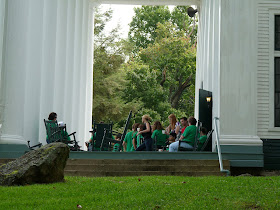ESR Associate Professor of Christian Spirituality Carole Spencer brings us this report from North Carolina Yearly Meeting:
The
315th Annual Sessions of the North Carolina Yearly Meeting of Friends (FUM) was held Aug. 31-Sept. 3, 2012 at Blue Ridge Assembly, an
historic YMCA retreat in Black Mountain NC.
I was asked to speak two evenings on the theme of “Community.” In choosing a text to speak from, I tried to
image what scripture Jesus might have used if he had been asked to address NCYM
on the theme of community. Since Jesus
quoted from Isaiah 56:7 at the turning point in his ministry when he cleansed
the Temple in Jerusalem, “My house shall be called a house of prayer for all peoples”
(Mark 11:17), I chose as scripture for my two messages, Isaiah 56:1-8, in which
we find the original context for Jesus’ words.
The theme thus became “Becoming a House of Prayer for all Peoples.”
The points which this passage reflects relevant to
community are: becoming a contemplative community (a house of prayer), and
becoming an inclusive and missional community (for all peoples). Verses 2-5 are especially relevant today:
welcoming the foreigner when our country seems to be entering a new era of
prejudice against foreigners, and welcoming
eunuchs, which relates to sexual differentness, so divisive in our
churches today. The context of this
passage, often called “Third Isaiah” is the return of the Jews from exile in
Babylon, rebuilding the Temple, and trying to regain their national identity by
pursuing a policy of increasing exclusiveness, reflected in a kind of “purity
movement” in which foreigners and eunuchs were excluded from the new worshiping
community. Those who wanted to carefully
preserve the Mosaic tradition of exclusivity had announced strict boundaries as
to who was in and who was out. But the
prophet counters with an astonishing announcement: these two most objectionable
classes of people are to be gathered, welcomed and celebrated in the new
community—a radical break with the law in Deuteronomy (Deut 23:1-6). The eunuchs were outcasts within the
Israelite society, the Other, usually slaves or servants, the outsider who was
sexually different, who could not bear children, thus would never have a “name”
as they had no descendents. But Isaiah
says: “Do not let the eunuch say ‘I am just a dry tree’ for they will be given
“a monument and a name better than sons and daughters…an everlasting name that
shall not be cut off.” (Isa. 58:2-5).
Isaiah envisions a gathering of diverse
peoples—exiles, outcasts, outsiders, foreigners, all “joined to the Lord” in a
house of prayer. While on one level he
is envisioning the rebuilt Temple in Jerusalem, on another level he is
envisioning an entirely new future community, a diverse, multi-cultural,
multi-ethnic, inclusive community of people united to God in prayer. The prophet’s radical vision was not realized
in his time, so some 500 years later, God comes down, even more radically than
the prophet’s message, into time and space, as a human being, to re-inaugurate
a new community.
Jesus called this new community, the Kingdom of God.
It was the heart of teaching and message. This kingdom is not simply about
heaven, but a community of transformation on earth. God’s purpose in salvation is to form us into
community, to become part of God’s mission in the world, which is what the word
“missional” means—“participating with God in what God is doing in the world.”
Which brings us full circle back to the incident
when Jesus quotes from Isaiah 56:7 as he overturns the tables in the Temple and
drives out those who had made it a “den of thieves”. He is radically overturning the patterns of
dominance and empire, the world’s understanding of power and privilege and
exclusion. He casts outs the “thieves”
and invites in the sick and lame and heals them.
Our communities are to be a foretaste, a sign, a
mini-version of this new inclusive community, which we are already living in
but has not been fully realized. We are to be missional communities
participating in the ongoing building of the reign of God in this world. To be
missional is to love God through loving our neighbors. “It is God’s mission, for which the Body of
Christ—the church—exists. We participate
in helping to build toward the dream God has planted in our hearts.”[1]
[1] A
quote from Katharine Jefferts Schori in Gathering at God’s Table.






No comments:
Post a Comment